After 700+ posts on this site (including 150+ book summaries and 200+ newsletter issues), it’s time to curate a top-10 list of the most life-changing ideas I’ve discovered to date.
Whether you’re new to Sloww or have been following for years, this is a great place to jump in. The post is organized below by the Sloww Stages:
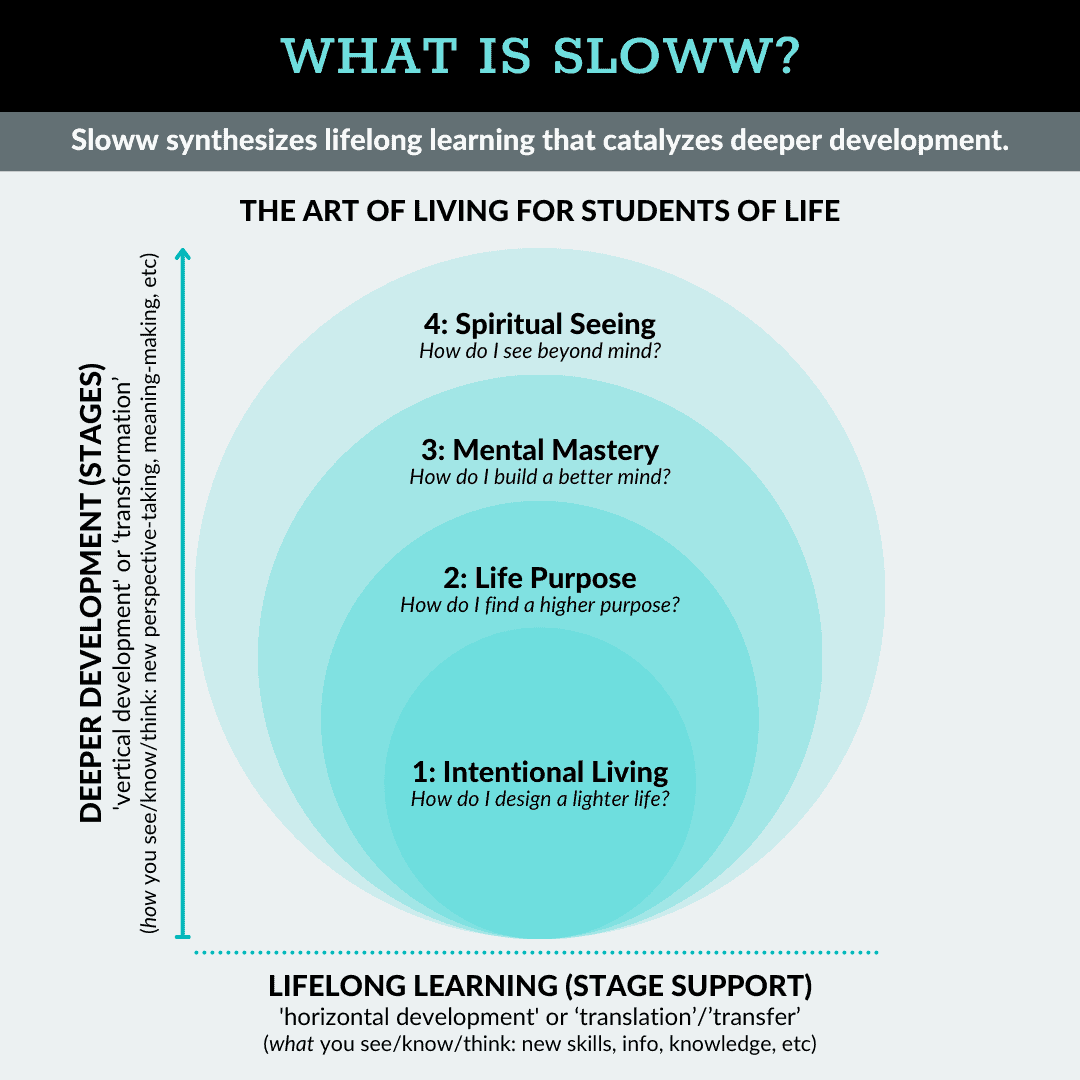
Post Contents:
📘🌀 Sloww Stage Support (Lifelong Learning & Deeper Development)
🌎 Sloww Stage 1 (Intentional Living)
🧭 Sloww Stage 2 (Life Purpose)
🧠 Sloww Stage 3 (Mental Mastery)
☯️ Sloww Stage 4 (Spiritual Seeing)
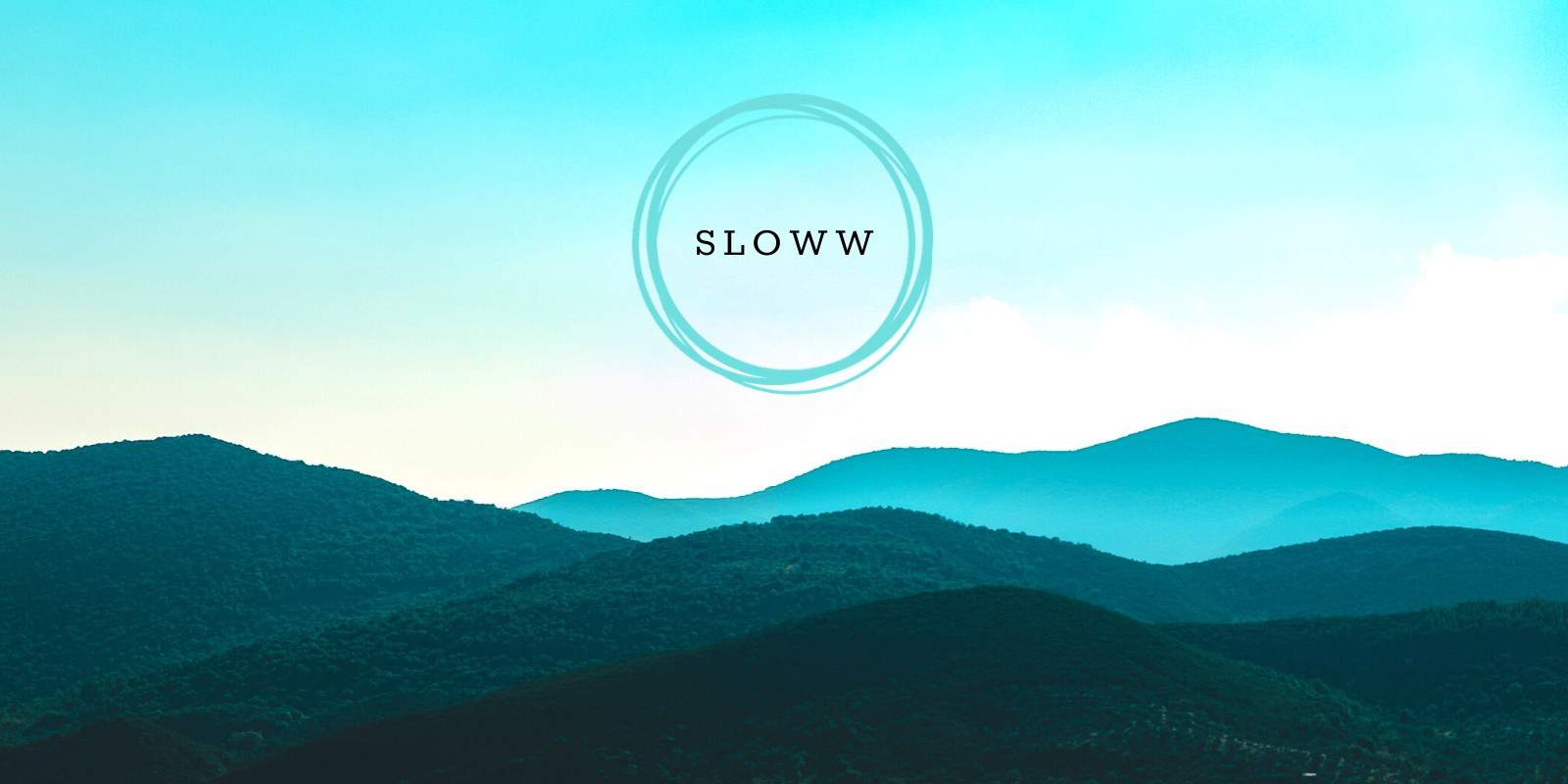
10 Most Life-Changing Ideas I’ve Discovered after 700+ Posts
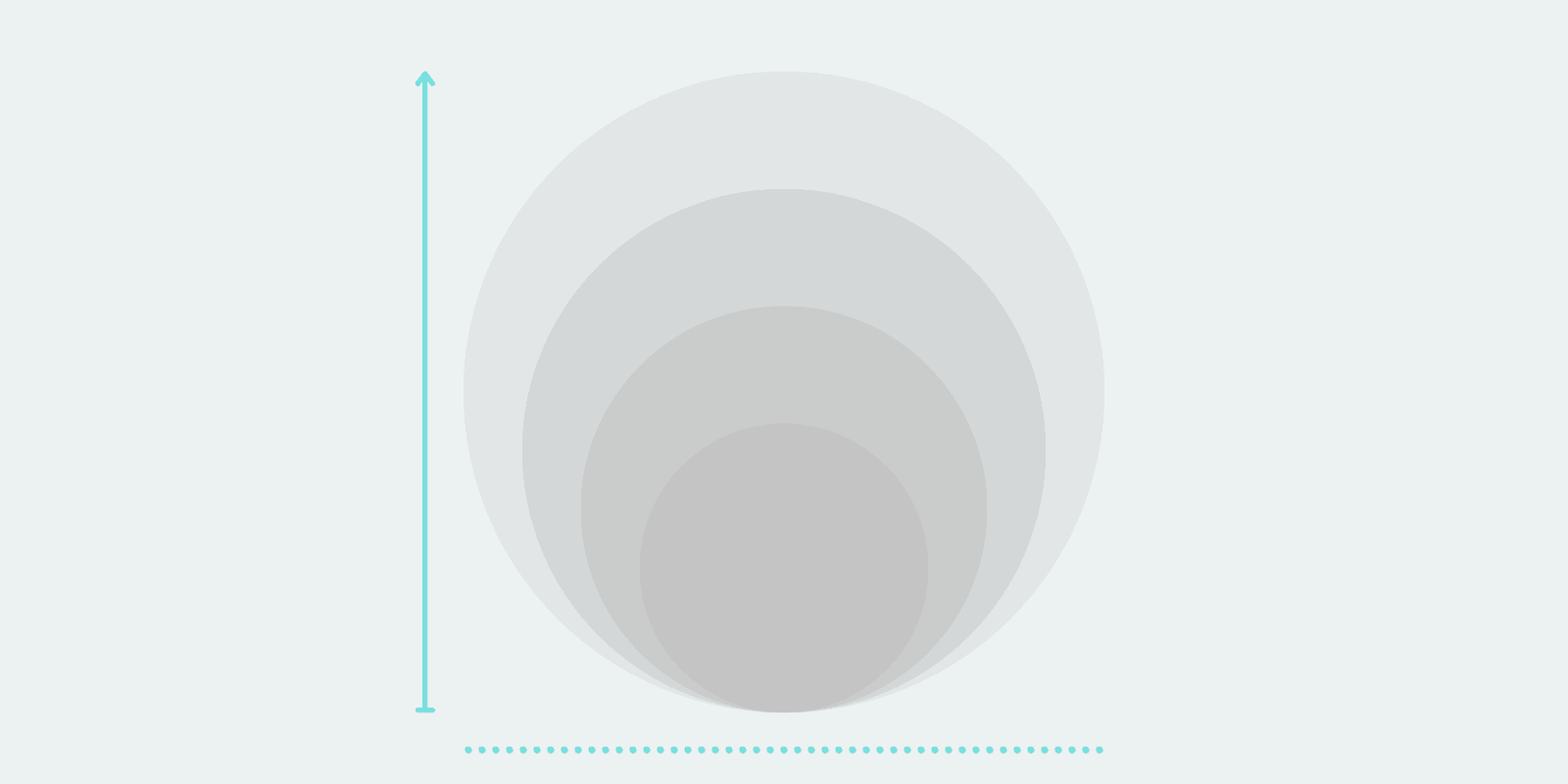
📘🌀 Lifelong Learning & Deeper Development (Sloww Stage Support)
The first two ideas are related to: Sloww Stage Support (Lifelong Learning & Deeper Development): How do I develop by learning?
1. Adult Learning
This can be considered an umbrella idea for many concepts: living inquiry, lifelong learning, adult learning, transformative learning, synthesizing, interdisciplinarity, etc. While those concepts do have nuanced definitions, there’s a thread that seems to run through adult questioning to adult learning to adult development. This topic is extra impactful to me because I now understand that it’s how I seem to be wired and how I can give myself to the world. I describe myself as an independent, inquiring, interdisciplinary integrator (in other words, a “synthesizer”). It’s been such a big realization that it’s even the topic of my first online course.
Living Inquiry (or adult questioning):
- 10 Deep Characteristics of Living Life as Inquiry + 🔒 Living Inquiry Synthesis: 20 Characteristics of Living Life as Inquiry
- 50+ Quotes to inspire Inquiring Minds to start Questioning Everything
- “First Person Action Research” by Judi Marshall (Book Summary)
Transformative Learning (or adult perspective transformation):
- “Understanding and Promoting Transformative Learning” by Patricia Cranton (Book Summary)
- “Transformative Dimensions of Adult Learning” by Jack Mezirow (Book Summary)
- 🔒 Transformative Learning Synthesis: How to Transform Your Perspective (+ Infographics)
- “Learning in Adulthood” (Book Summary)
Interdisciplinary Learning (also multi-/trans-disciplinarity):
- “The 7 Transdisciplinary Cognitive Skills for Creative Education” (Book Summary)
- “Introduction to Interdisciplinary Studies” (Book Summary)
- “Interdisciplinary Research” by Repko & Szostak (Book Summary)
- 🔒 Interdisciplinary Synthesis: How to be an Interdisciplinarian (+ Infographics)
Synthesizing Minds:
- Synthesizer Course (The Synthesizer Manifesto + What is the SYNTHE System?)
- 25 Synthesis Quotes to inspire the Aspiring Synthesizers + 🔒 Meta-Synthesis: 100+ Quotes on Synthesis, Synthesizers, & Synthesizing Minds
- “A Synthesizing Mind” by Howard Gardner (Book Summary + 🔒Premium Summary)
- Synthesizers: Why the Future Belongs to the Idea Connectors + Combinatorial Creativity: The Art of “New” Ideas & Why Everything is a Remix
- 🔒 Maria Popova Synthesis: How to be a World-Class Synthesizer like “Brain Pickings” / “The Marginalian” (+ Infographic)
2. Adult Development
Similarly, this is an umbrella idea that includes many concepts: adult development, human development, psychological development, vertical development, perspective transformation, etc. It has completely transformed how I view myself, others, and life itself. Of all the theories I’ve seen, Susanne Cook-Greuter’s “ego development theory” and Robert Kegan’s “subject-object theory” have resonated the most. Why? Because I didn’t discover them until after I had already gone through several “stages,” and it was incredible how closely my own lived experience matched the descriptions. Stage theories have their fair share of critics out there (see the Nora Bateston post below), but I’ve found learning about them to be a net positive in my life.
Human Development Overview:
- Human Development 101: What are Horizontal & Vertical Development?
- Polarity Thinking 101: An Introduction to the Power of Polarities (+ Visuals)
- 🔒 How Many Perspectives Can You Take?
- 🔒 What is the Subject-Object Relationship?
- 🔒 Is Developmental Stage Theory BS? (Nora Bateson Synthesis)
Meta-Crisis Overview:
- A Crisis of Crises: What is the Meta-Crisis? (+ Infographics)
- Introducing the “Meta-Crisis Meta-Resource”: A Digital Directory of all People & Projects in the Wisdom Web
- 50+ Deep Perspectives on Humanity’s Underlying & Ultimate Challenge (Hint: Ourselves)
- 🔒 Is the Meta-Crisis a Me-Crisis?
Ego Development Theory (Susanne Cook-Greuter):
- “Ego Development Theory” by Susanne Cook-Greuter (EDT Summary) + Humanity is Stuck in Development at the “EDT Watershed Stage”
- 🔒 My Ego Development Theory Self-Assessment
- 🔒 How my Sloww Stages map to EDT Stages
Integral Theory (Ken Wilber):
- “The Integral Vision” by Ken Wilber (Book Summary)
- “A Brief History of Everything” by Ken Wilber (Book Summary) + “A Theory of Everything” by Ken Wilber (Book Summary)
- “Integral Psychology” by Ken Wilber (Book Summary) + “Integral Spirituality” by Ken Wilber (Book Summary) + 🔒 Integral Psychology & Spirituality Synthesis: How to Develop Holistically with Ken Wilber (10+ Visuals)
- “Finding Radical Wholeness” by Ken Wilber (Book Summary)
- 20 Tenets of Integral Theory: An Intro to the Philosophical Principles of Ken Wilber
- 🔒 Ken Wilber Synthesis: Everything about Integral Theory (10+ Visuals)
Hierarchy of Needs (Abraham Maslow):
- “The Farther Reaches of Human Nature” by Abraham Maslow (Book Summary)
- “Transcend” by Scott Barry Kaufman (Book Summary)
- Maslow on Self-Actualization, 🔒 Self-Actualization Synthesis, & 🔒 My Self-Actualization Self-Assessment
- Maslow on Transcendence, 24 Characteristics of Transcenders, & 🔒 Transcendence Synthesis
- Maslow’s Holarchy of Needs: Should the Hierarchy of Needs Pyramid be Redesigned?
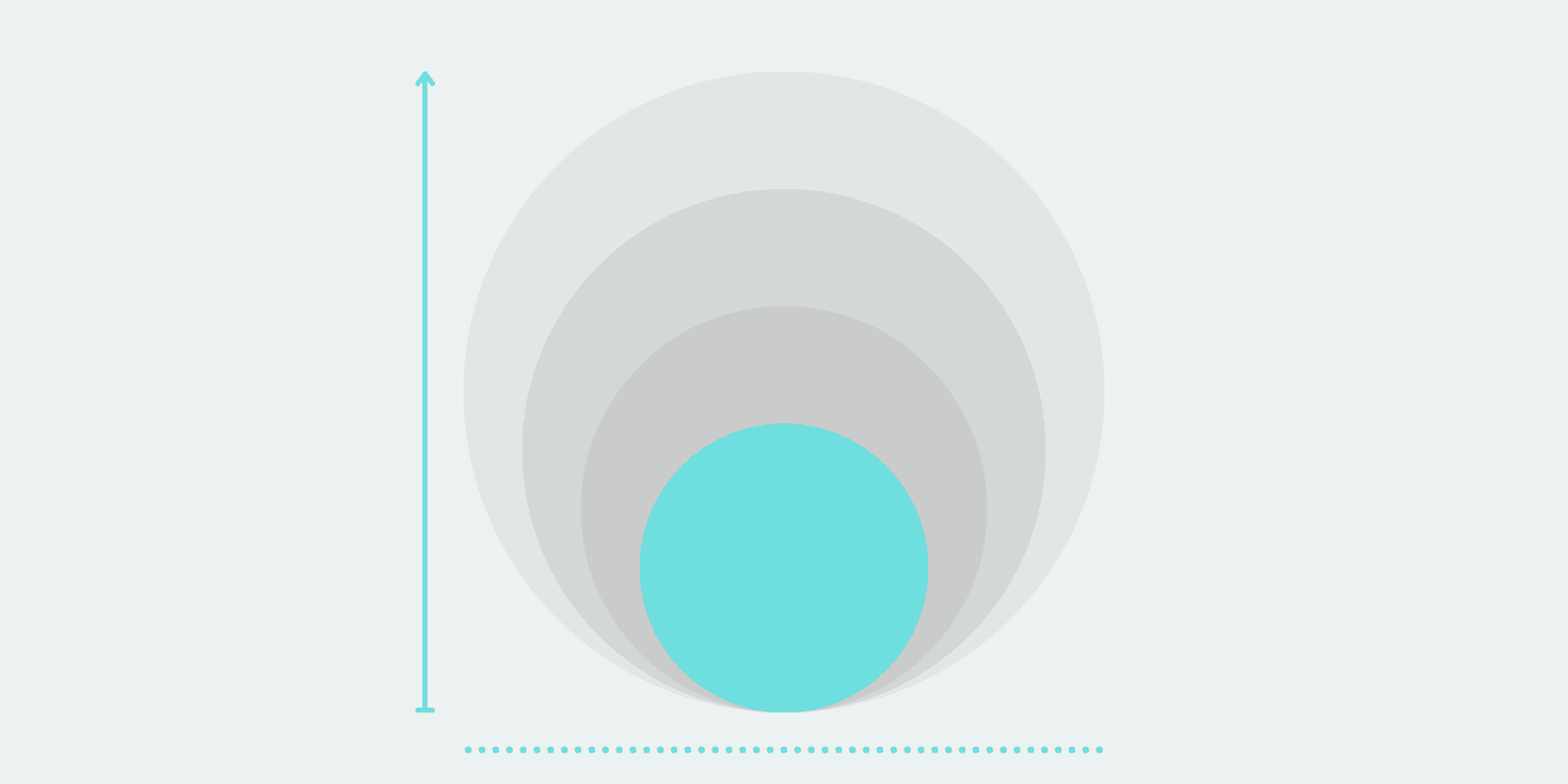
🌎 Intentional Living (Sloww Stage 1)
The next two ideas are related to: Sloww Stage 1 (Intentional Living): How do I design a lighter life?
3. Slow & Simple Living
The discovery of the concepts of slow living, simple living, voluntary simplicity, and downshifting completely rocked my worldview. Prior to this discovery, I had no idea there were people out there intentionally choosing slower and simpler lives. These ideas I discovered in late 2015 and early 2016 planted the seed for all things Sloww.
Busyness:
- Busyness 101, 201, & 301
- Why do we FEEL So Busy when Research says we’re NOT Busy?
- Why Busyness is the Current Status Symbol (According to Research)
- Too busy? 10 Tips for Slowing Down & Becoming Unbusy
- Good Busyness? A Full Life vs A Busy Life
Slow Living:
- Slow Living 101, 201, & 301
- 15 Slow Living Synonyms to Help You Slow Down
- “In Praise of Slowness” by Carl Honoré (Book Summary + 🔒Premium Summary)
- “Slow” by Brooke McAlary (Book Summary)
- “Chasing Slow” by Erin Loechner (Book Summary)
Simple Living:
- What is Downshifting? How to Transition into Simple Living
- Voluntary Simplicity: “Listening to the Quiet Revolution” (Thesis Summary)
- “Voluntary Simplicity” by Duane Elgin (Book Summary)
- “The Value of Voluntary Simplicity” by Richard Gregg (Essay Summary)
- “The Quest of the Simple Life” by W. J. Dawson (Book Summary)
4. Lifestyle Design
I’ve realized that much of intentional living comes down to lifestyle design. And, when it comes to lifestyle design, nothing has been more impactful for me than Jacob Lund Fisker’s work on Early Retirement Extreme. He’s applied systems thinking to lifestyle design, and it brilliantly covers all aspects of life. The most impactful idea I’ve taken from him is to design a “web of goals.” This concept helps you set up your life in a way where you have mutually-reinforcing positive goals and byproducts (maximizing synergy) while also reducing/eliminating negative byproducts (minimizing waste). The “web” focuses on the connections between your lifestyle choices and includes everything from health to wealth to wisdom. An example would be a web where you live within walking/biking distance of work and the grocery store—your commute doubles as your daily exercise (maximizing synergy) while eliminating the need for a car and saving money (minimizing waste). The “web of goals” idea is presented in much more detail in the 🔒Early Retirement Extreme Synthesis.
Lifestyle Design:
- Lifestyle Design 101: What is Lifestyle Design? (& 35+ Questions to Ask Yourself)
- Lifestyle Inflation: The Danger of “I Deserve This”
- “The Pathless Path” by Paul Millerd (Book Summary) + 🔒 How my Personal Journey compares to “The Pathless Path”
- Optimize/Heroic with Brian Johnson: Virtues, Habits, & the Fundamentals of Optimal Living + 🔒 Premium Synthesis
- 🔒 A Look at My Personal Lifestyle Design
Money:
- Money Mind Manifesto: Master Your Mind from the Mental Disease of More Money
- FIRE 101: A Beginner’s Guide to FIRE (Financial Independence Retire Early)
- “Early Retirement Extreme” by Jacob Lund Fisker (Book Summary + 🔒Premium Synthesis)
- “The Psychology of Money” by Morgan Housel (Book Summary)
- 🔒 My Evolving Relationship toward the “Money Middle Way”
Work:
- Is the American Dream Waking Up? The Truth about Social Mobility in the US
- The Busy Spectrum (High Busyness): What You Need to Know about Workism & Hustle Porn
- The Busy Spectrum (Low Busyness): What You Need to Know about Bullshit Jobs & Performative Busyness
- Total Work: When Humans are Transformed into Workers and Nothing Else (Were we Born only to Work?)
- Post-Workism & Total Work: 5 Future Scenarios when the Religion of Work Loses Followers
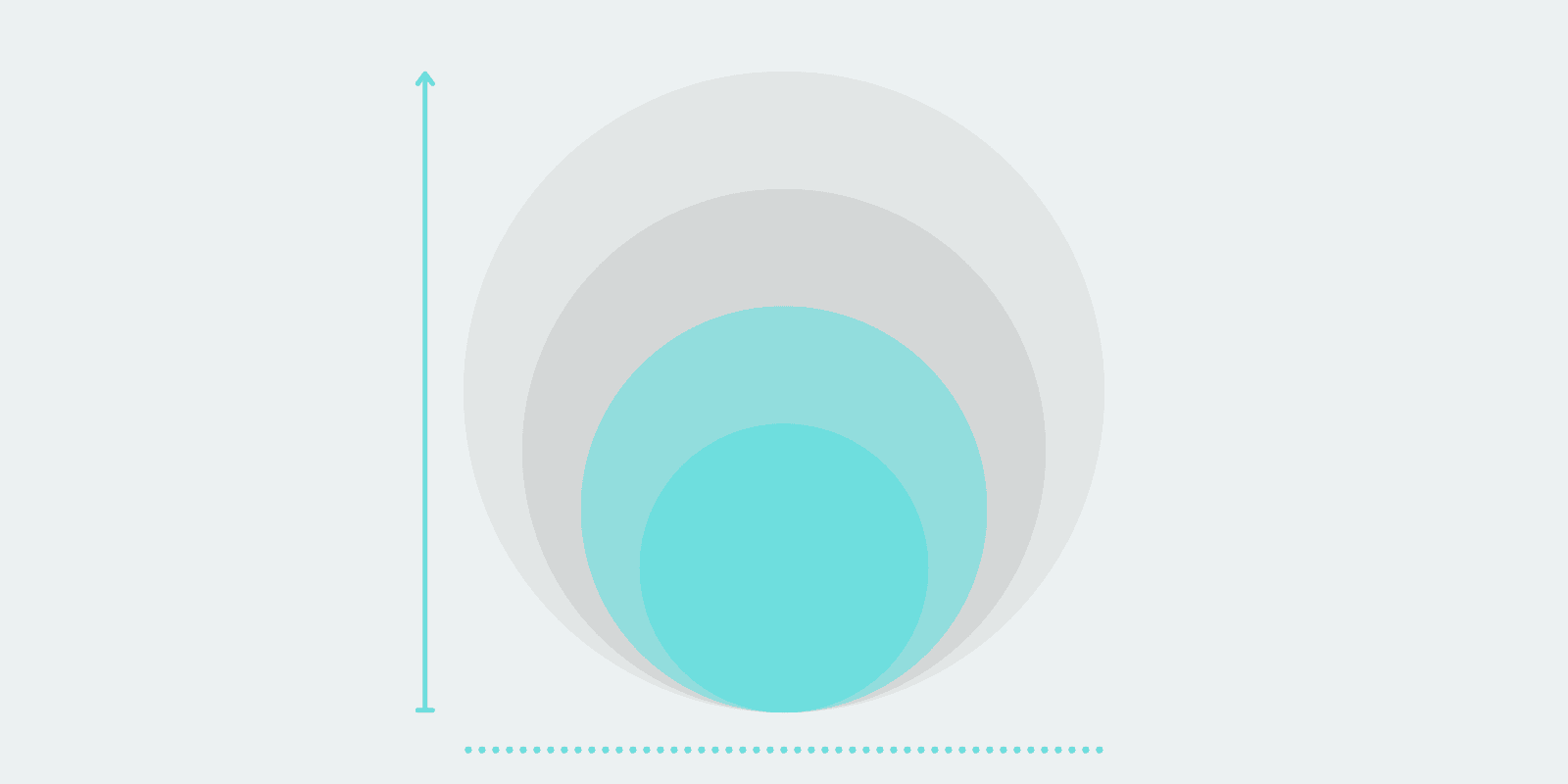
🧭 Life Purpose (Sloww Stage 2)
The next two ideas are related to: Sloww Stage 2 (Life Purpose): How do I find a higher purpose?
5. Ikigai
Ikigai was a concept I discovered either during my existential crisis in 2015 or in 2016 when I was searching for purpose. But, my discovery of the viral 4-circle diagram led me down a path to uncover that it’s not really ikigai. Eventually, I put 5+ years of research and experimentation into an eBook: Ikigai 2.0: A Step-by-Step Guidebook to Finding Life Purpose & Making Money Meaningfully (+ Bonus Workbook). This is the process I used to find my own purpose, and it’s still the approach I recommend to everyone who asks me the best way to find purpose. In my mind, you will not find anything more comprehensive (yet concise) than Ikigai 2.0.
Ikigai:
- What is the Hedgehog Concept by Jim Collins? (& How Does it Compare to Ikigai?)
- The True Meaning of Ikigai: Definitions, Diagrams & Myths about the Japanese Life Purpose
- Ikigai 2.0: Evolving the Ikigai Diagram for Life Purpose (& Why and How it Needs to be Redesigned)
- My Ikigai 2.0: A Detailed Personal Ikigai Example of How to Find Your Life Purpose
- Introducing “Ikigai 2.0”: A New eBook for Finding Life Purpose & Making Money Meaningfully
Purpose:
- I had an Existential Crisis! (+7 Ways to Positively Overcome It)
- What is Your Purpose in Life? 10 Deep Thoughts to Guide Your Hero’s Journey to Finding Life Purpose
- What is a Talent Stack? (& How I’m Thinking about My Unique Stack)
- 🔒 Life Purpose Search Synthesis: I Googled “Life Purpose” & Read 100+ Articles (Literally)
- 🔒 Can you be Selfish AND Save the World?
Monetizing Purpose:
- “The Almanack of Naval Ravikant” (Book Summary)
- “How to Get Rich (without getting lucky)” by Naval Ravikant (Summary & Infographic)
- 🔒 Naval Ravikant Synthesis: How to Build Wealth by Being Yourself (+ Infographics)
- 🔒 Monetizing Purpose Synthesis: How to Meaningfully Make Money from Your Life Purpose (+ Infographics)
6. Birth Lottery
This idea is literally something that I now think about daily and has positively altered my worldview and how I interact with others in the world. If I could put anything on a billboard, this may be it. And, the best part is that the lottery of birth requires no science or spirituality to understand. What is the lottery of birth? It’s a reminder that you did not choose or control: to exist, your nature, your nurture, the location you were born into, the time you were born into, and so much more. No one did! And all of those shape you and your life path—just like they shape every other human. It may be one of the most simple, yet most profound, realizations any human can have to lead to compassion for all.
Birth Lottery Overview:
- 10 Birth Lottery Videos to Realize Your Luck in Life
- 25+ Birth Lottery Implications to Clearly See why it Matters so Much
- 50+ Birth Lottery Quotes to Question Who You Are
- The Lottery of Birth: All the Things You Don’t Choose or Control in Life + 🔒 Lottery of Birth Synthesis
- “Creating Freedom” by Raoul Martinez (Part 1 Lottery of Birth Book Summary)
Thought Experiments:
- Ovarian Lottery Thought Experiment (Warren Buffett)
- “Original Position” or “Veil of Ignorance” Thought Experiment (John Rawls)
- Swapped at Birth: Lottery of Birth Thought Experiment (Raoul Martinez Excerpts).
How I personally think about it:
- 🔒 Dissecting my own Lottery of Birth Ticket
- 🔒 Do You Control Your Life Path?
- 🔒 Do You Live Life, or Does Life Live You?
- 🔒 Is Free Thinking Even Possible?
- 🔒 Is this the Strangest Thing in Life?
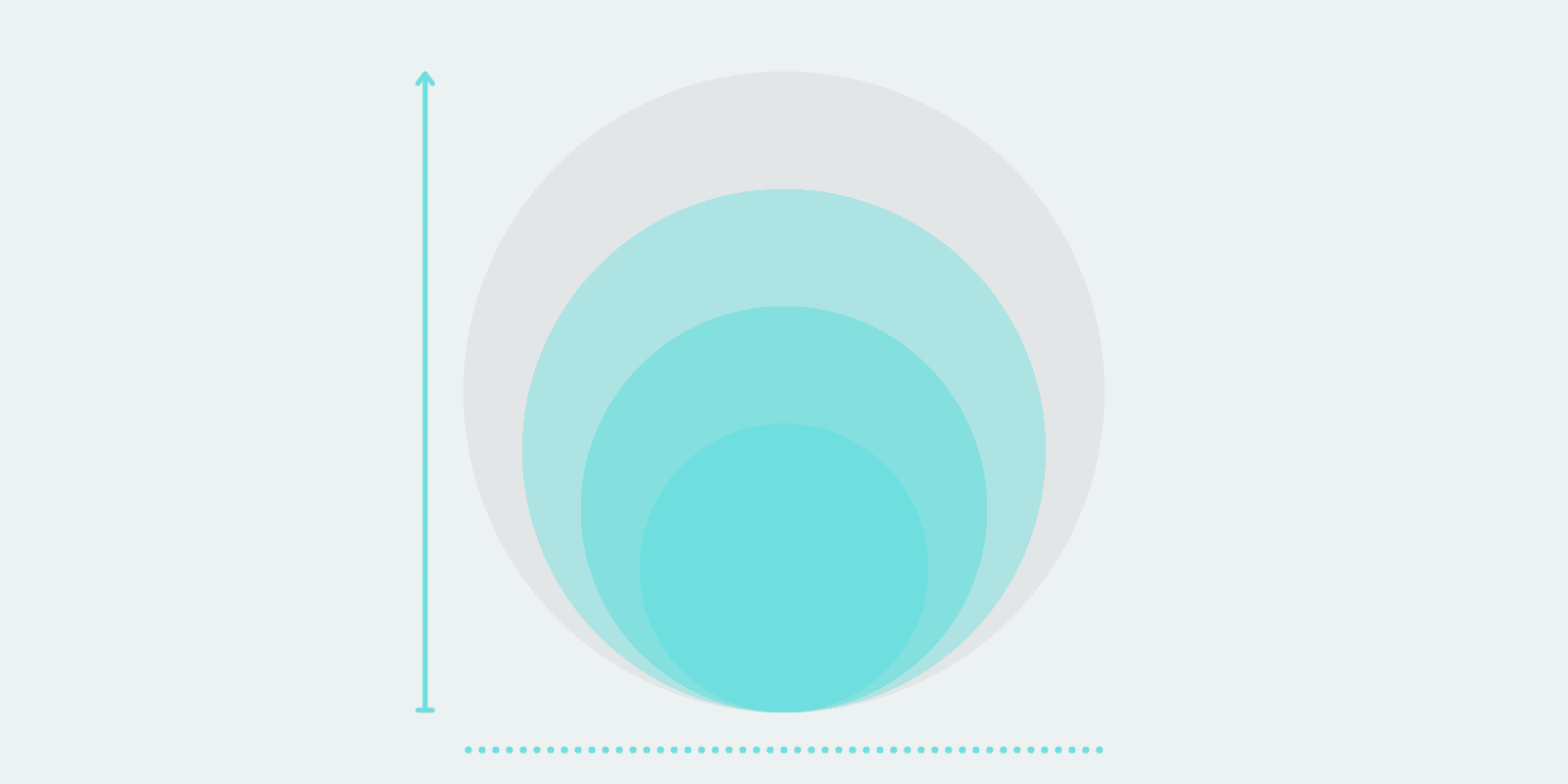
🧠 Mental Mastery (Sloww Stage 3)
The next two ideas are related to: Sloww Stage 3 (Mental Mastery): How do I build a better mind?
7. Mind Immunity
Mental models seem to get a bad rap from a lot of people. It seems to be because many think learning about mental models doesn’t equate to applying them. That’s true. But, at the same time, no awareness of something is a guarantee that it will not be applied. So, I fully believe in being aware of all these concepts, learning about them effectively through tactics like spaced repetition and interleaving, and integrating and embodying them through consistent practice in your day-to-day life. To help with this, I launched Mini Mind.
The Brain:
- “The Master and His Emissary” by Iain McGilchrist (20 Brain Hemisphere Differences)
- “Livewired” by David Eagleman (Book Summary)
- “Conscious” by Annaka Harris (Book Summary)
- “Whole Brain Living” by Jill Bolte Taylor (Book Summary)
- “The Extended Mind” by Annie Murphy Paul (Book Summary)
The Mind:
- “The Art of War” by Sun Tzu (Book Summary)
- 25 Mental Models + 25 Cognitive Biases + 25 Philosophical Razors
- 35+ Deep Daniel Schmachtenberger Quotes on Civilization Design, Game Theory, Sense-Making, Sovereignty, & More + 🔒 Daniel Schmachtenberger Synthesis
- The Consilience Project 101: An Introduction to the Catalyzing of a Cultural Renaissance + 🔒 The Consilience Project Synthesis
- 🔒 Mental Mastery Cheatsheet: 500+ Cognitive Concepts Curated (Biases, Fallacies, Effects, Illusions, Heuristics, Mental Models, & More)
8. Free Will
This final idea falls right out of the previous one. As they say, “the self” and “free will” are two sides of the same coin. In other words, successful self-inquiry resolves the question of free will.
Start Here:
- The Ultimate Free Will Guide for Open Minds & Sincere Seekers
- 25 Ways to Melt Away the Feeling of Free Will
- 50+ Free Will Questions to Examine the Nature of Your Reality
- 🔒 Is this the Holy Shit Moment?
- 🔒Are there Stages of Seeing Free Will?
- 🔒 How I Live with the Lottery of Birth & Lack of Free Will + 🔒 1 Year Later
Moral Luck & Responsibility:
- “Moral Luck” by Thomas Nagel (Essay Summary)
- “Hard Luck” by Neil Levy (Book Summary)
- The Life of Luckia: A Thought Experiment on the Birth Lottery, Moral Responsibility, & Free Will
- 🔒 Is Ultimate Moral Responsibility a Myth?
- 🔒 What’s our Problem with (Mis)Attribution of Agency?
No Free Willers:
- Sam Harris: Book Summary, Thought Experiments, Latest Thinking Summary, 🔒 Synthesis
- Robert Sapolsky: Book Summary, Thought Experiment, Latest Thinking Summary, The Homunculus Fallacy, 🔒 Synthesis
- Bernardo Kastrup: Summary + 🔒 Synthesis
- Galen Strawson: Book Summary, Basic Argument, Thought Experiment
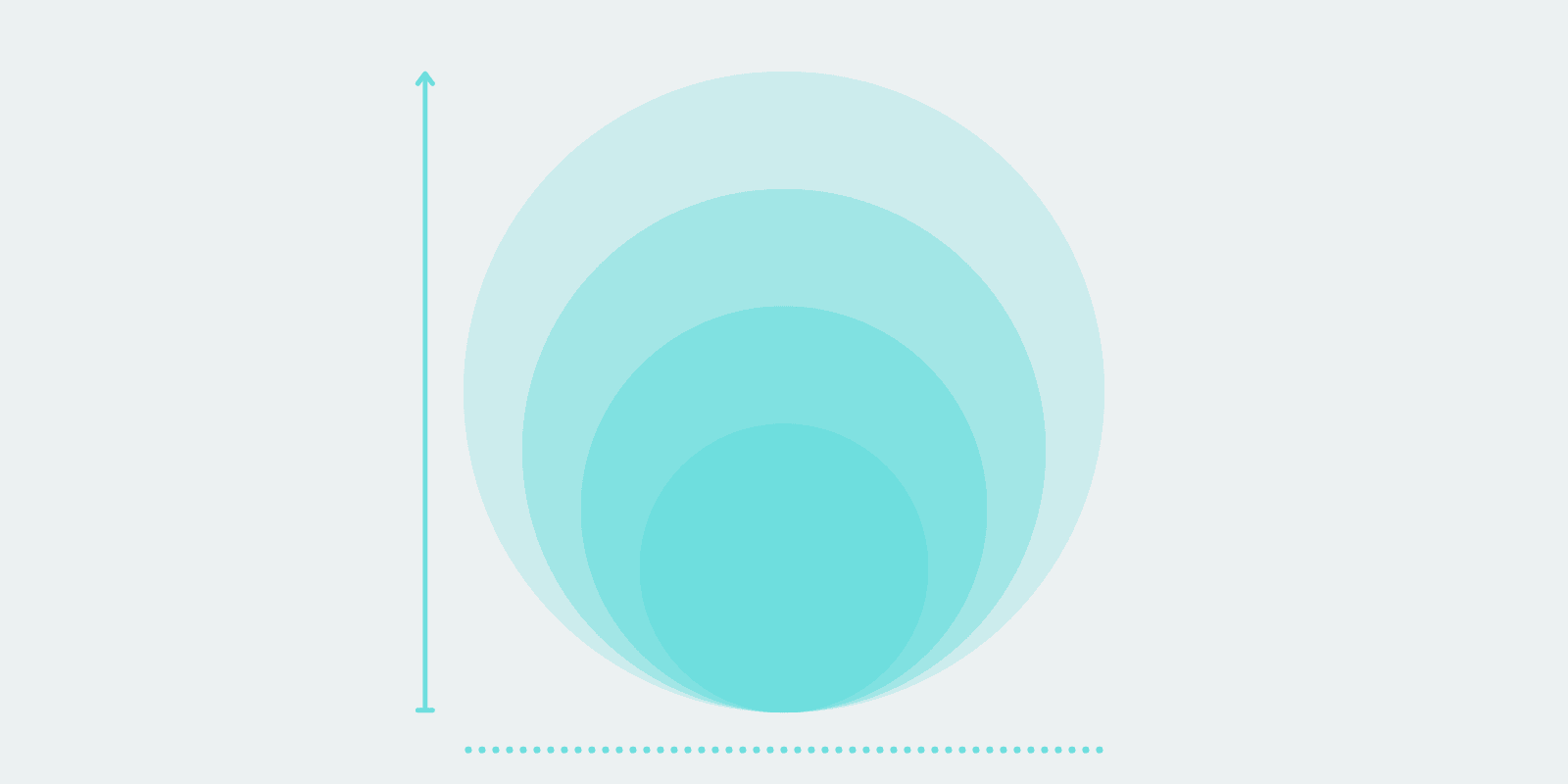
☯️ Spiritual Seeing (Sloww Stage 4)
The final two ideas are related to: Sloww Stage 4 (Spiritual Seeing): How do I see beyond mind?
9. Self-Inquiry
It’s only fitting that we start to wrap up this list with a concept that can hardly be described as a concept. While appreciating the mind, we simultaneously need to realize what’s beyond mind. The books and teachers below may just be “fingers pointing at the moon,” but they seem to be pretty good guides.
Seeing Your Socialization:
- 25+ Deep Quotes on the Differences between Religion & Spirituality
- 50+ Deep Quotes to Free Your Mind from Psychological Prison
- The Societal Drug keeping You a Sleeping Robot (Anthony de Mello Excerpt)
- 50+ Anthony de Mello Quotes on Programming, Awareness, Love, & More
- “Awareness” by Anthony de Mello (Book Summary + 🔒Premium Summary)
- “The Way to Love” by Anthony de Mello (Book Summary)
- “The Book” by Alan Watts (Book Summary)
- “Thought as a System” by David Bohm (Book Summary) + Is Matter to Space what Thought is to Consciousness?
Self-Inquiry:
- “Who am I? The Teachings of Bhagavan Sri Ramana Maharshi” (Book Summary)
- “Be As You Are” by Ramana Maharshi (Book Summary + 🔒Premium Summary)
- 🔒 How to Practice Self-Enquiry with “Be As You Are” by Ramana Maharshi (+ Infographic)
- 🔒 How to Answer the Ultimate Question of “Who am I?” with Alan Watts
The Witness:
- 🔒 What is Witness Consciousness?
- 🔒 How to Wake Up with The Witness & One Taste from Ken Wilber (+ Infographic)
- 🔒 How to Practice Witnessing with “Be Here Now” by Ram Dass (+ Infographic)
- 🔒 Nisargadatta Maharaj Synthesis: Everything about the Witness (+ Infographic).
10. Beyond Mind/Self
It all points here.
Short Posts:
- The Misguided Pride of Achievement (Nisargadatta Maharaj Teaching Pointer)
- A Search Party for the Self: Searching for what is “Missing” (Sam Harris)
- What’s between Question & Answer? (Francis Lucille & Rupert Spira)
- Tea or Coffee: Who is the Chooser of a Choice? (Rupert Spira)
- The Dream Metaphor of Mary & Jane (Rupert Spira)
- 🔒 What is Enlightenment?
The Headless Way:
- 50+ Douglas Harding Quotes on Spirituality, Self-Inquiry, Headless Way, & More
- “On Having No Head” by Douglas Harding (Book Summary)
- “The Science of the 1st Person” by Douglas Harding (Book Summary)
- 🔒 How to See Clearly with the Headless Way Experiments (+ Visuals & Videos)
Direct Path Nonduality:
- 50+ Atmananda Krishna Menon Quotes on Nonduality, Witness, Doer, & More + 🔒Atmananda Krishna Menon Synthesis: Everything on the Direct Path (+ Infographic)
- 50+ Jean Klein Quotes on Self-Inquiry, Knowing, Silence, & More
- “Being Aware of Being Aware” by Rupert Spira (Book Summary + 🔒 Rupert Spira Synthesis +🔒 Screen Analogy)
Advaita Vedanta:
- 15+ Ramana Maharshi Quotes on The Doer, Free Will, & God’s Will
- 25+ Ramakrishna Quotes on The Doer, Free Will, & God’s Will
- 25+ Swami Vivekananda Quotes on Free Will & Freedom
- 50+ Swami Sarvapriyananda Quotes on Advaita Vedanta, Reality, Self, & More
- “Who Am I?” by Swami Sarvapriyananda (Book Summary)
What Sloww concepts have been life-changing ideas for you so far? Please let me know in the comments!
You May Also Enjoy:





Leave a Reply